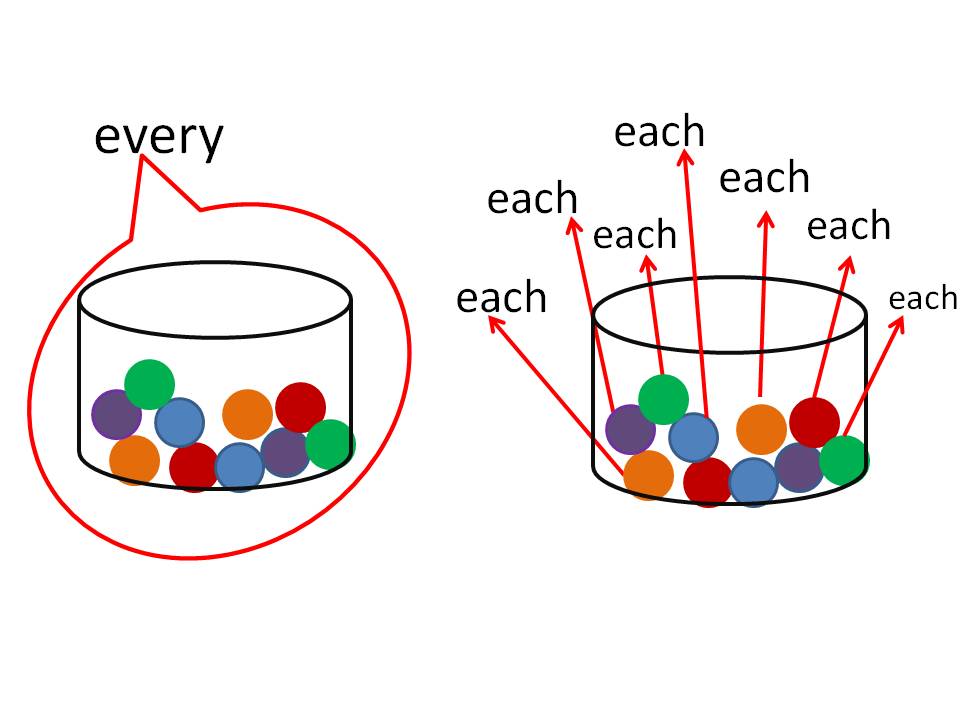
Every or Each (rule and test) 8 Мая 2017 English For You
In this video, learn how to use "all" and "every" correctly so you can improve your basic English grammar and make sure you are avoiding this common grammar.
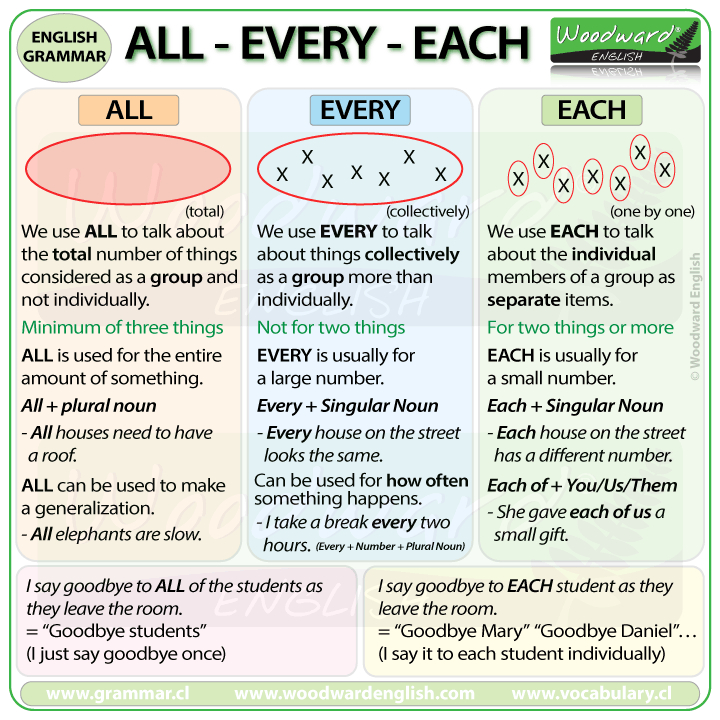
All Every Each Effortless English
Each and every can mean 'each one', 'every one' or 'all': • EACH is used when all cases are considered separately: Each of them is extremely qualified. They are all extremely qualified. (or Each one of them.) Each day is an adventure. Monday, Tuesday, Wednesday, Thursday, Friday, Saturday and Sunday are all adventures.

Diferencia entre all y every en inglés. Ejercicios inglés online
James is busy, but I can answer this question for you. These two expressions 'tend to', and 'intend to', sound very similar, but they have different meanings. tend to - This is used to talk about something you do often. 'tend' here comes from the word 'tendency' — like a habit.

'All' or 'Every'? English ESL worksheets pdf & doc
Quantifiers: each and every. Every child needs a healthy diet. Each lesson lasts one hour. She gave us each an apple. Tickets cost £10 each. There's a bus every 20 minutes. We use every + singular noun to mean all the people or things in a group, and this often suggests there is a large number in the group. Every child needs a healthy diet.
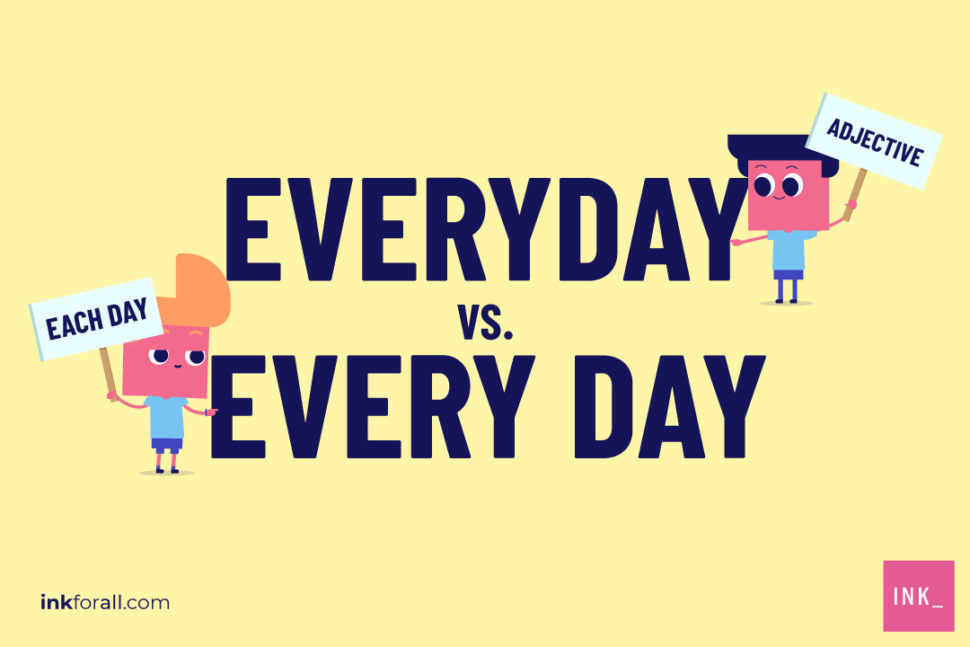
Everyday vs. Every day Here's how to Pick the Correct Word INK Blog
2 Closed. This question is off-topic. It is not currently accepting answers. Proofreading questions are off-topic unless a specific source of concern in the text is clearly identified. Closed 10 years ago. Improve this question What would be the difference between these: Everyone of them rose from their seats. All of them rose from their seats.

Each vs Every Belajar, Bahasa, Bahasa inggris
A question concerning concord; what kind of verb goes with all. Is it singular or plural: All is finished or All are finished? Roger Woodham replies: Every

Difference Between Each, Every, All Lessons For English
everyone vs. all all every everyone indefinite pronouns universal pro-forms 'Everyone' and 'all' have a similar meaning when talking about people. They both mean all the people in a group'. But are they 100% the same? Main Similarity ' Everyone ' and ' all ' have similar meanings. They both are used to talk about '100% of the group'.
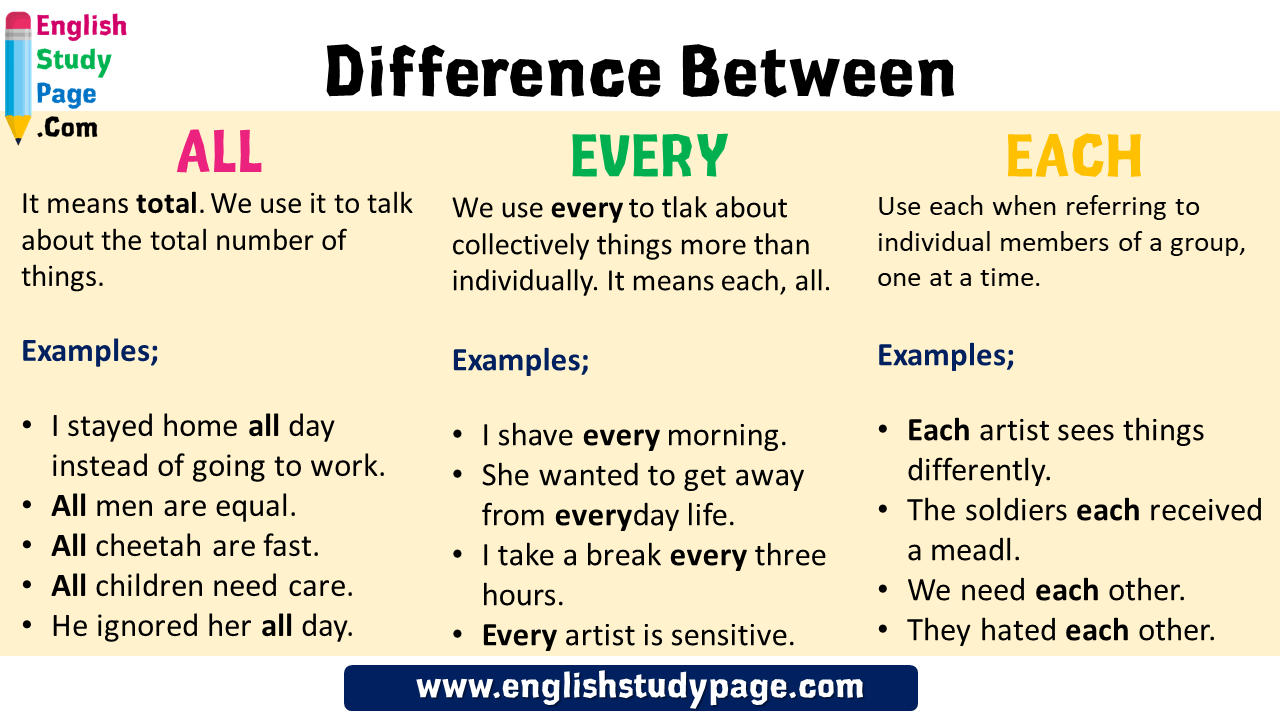
Difference Between Every, All and Each in English Grammar English Study Page
A1 every one (of), or the complete amount or number (of), or the whole (of): all day I've been trying all day to contact you. all of Did you really drink all of the milk? all the time Why do you get so mad at me all the time (= very often)? all the way It's very kind of you to come all the way to meet me.
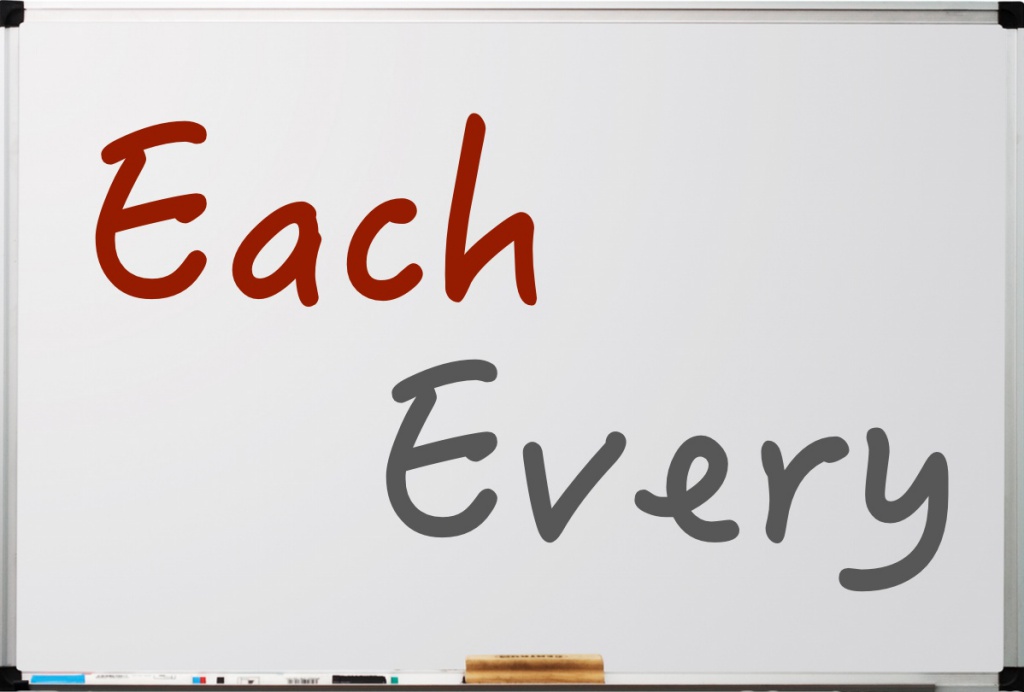
تفاوت each و every گرامر انگلیسی زبان امید
All or ? Each? Every: regular situations We use every with a singular noun to refer to something that happens regularly: The festival is held every August in Budapest. I leave the house every morning at 6 am. Not: I leave the house every mornings at 6 am. We use every with a number and a plural noun to refer to regular intervals of time or numbers:
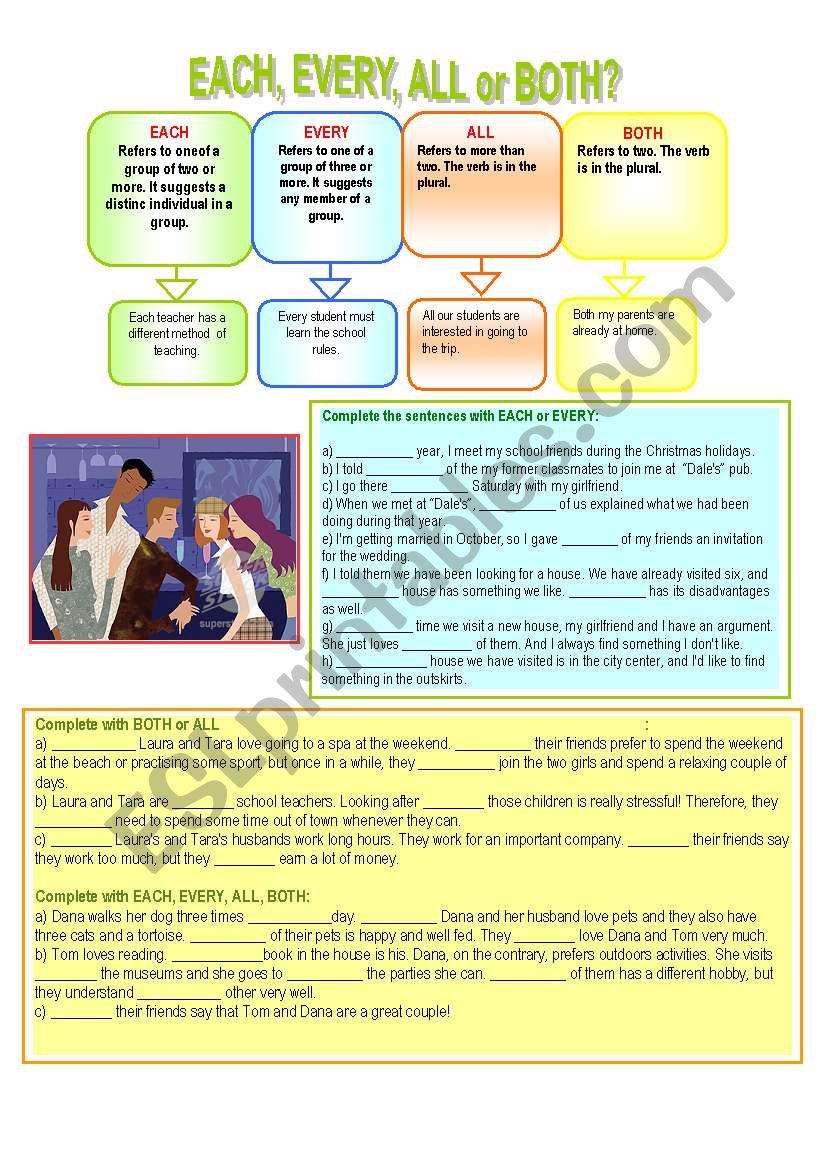
each, every, all or both? ESL worksheet by Nuria08
2. I spent all / all of the week with my parents. 3. She was here all day. 4. She was here every day of the week. 5. Suddenly all the lights / all of the lights went out. 6. All Paris was talking about their affair. 7. I have invited all my / all of my friends. 8. I have invited every friend I have. 9. My parents lived their whole life in.

Pin on ll
All refers to a complete group. Every refers to each member of a complete group: The questionnaire was sent to all employees. The questionnaire was sent to every employee. We can use every to focus on each individual member. Compare We can use all, but not every, on its own without a noun. We use everyone / everybody / everything instead:
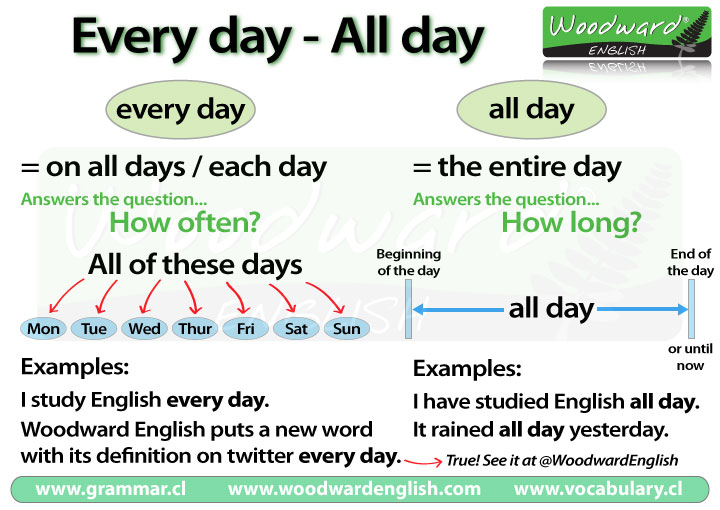
25 [pdf] ENGLISH SPOKEN EXERCISE PRINTABLE HD DOCX DOWNLOAD ZIP * EnglishExercises
We use ALL to talk about the total number of things, with everything considered as one group and not individually. ALL is used for the entire amount of something. This amount is a minimum of three things. When there are two, instead of saying ALL you say BOTH (We will learn more about BOTH in another lesson) We use EVERY to talk about things.
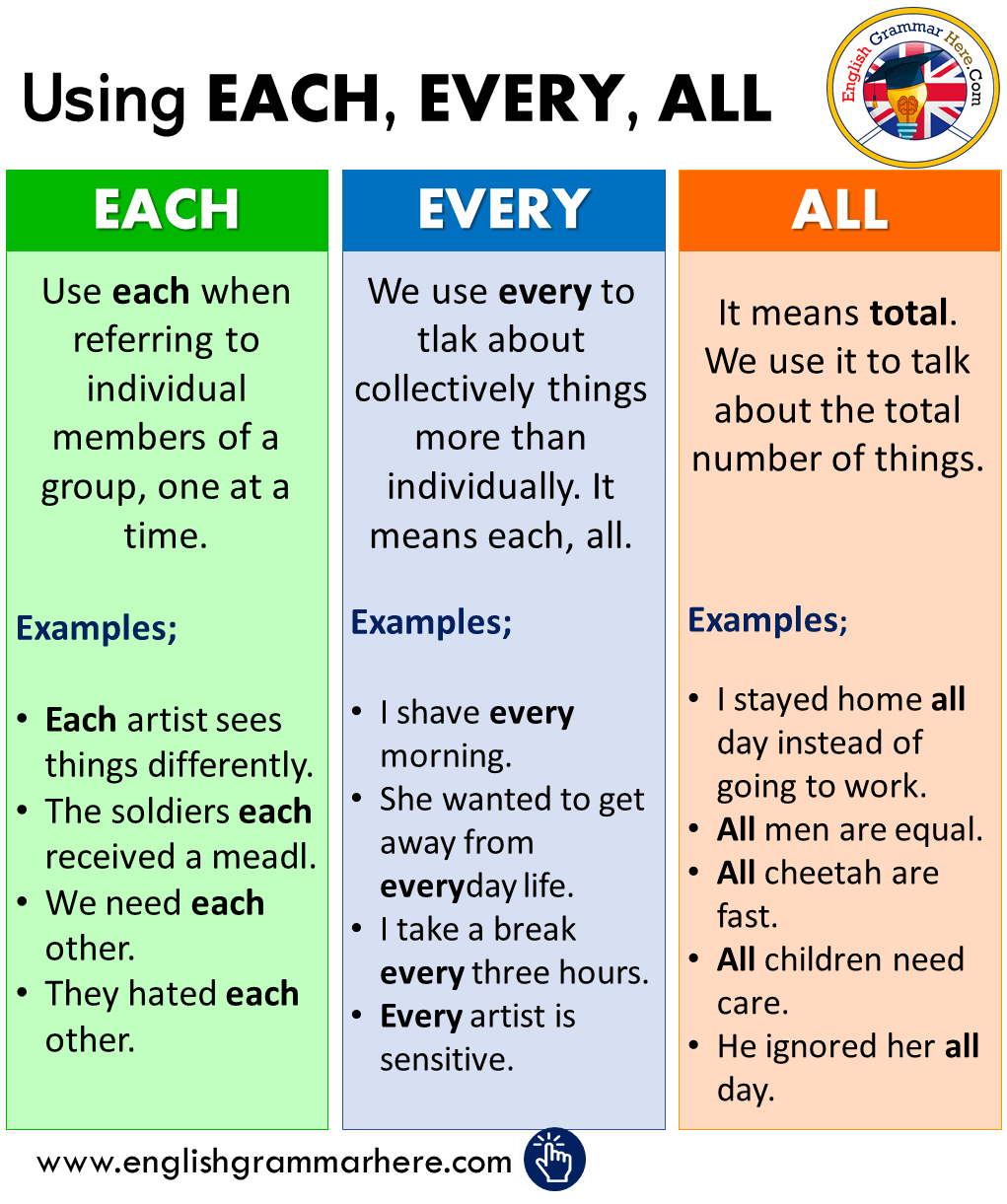
How to Use EACH, EVERY, ALL in English, Example Sentences English Grammar Here
The most important things to keep in mind are: If you want to emphasize the individual, use each. If you want to emphasize the group, use every. When used before a singular noun, each and every are followed by a singular verb. After a plural subject, only each can be used and is followed by a plural subject.

Everything Everywhere All At Once—a review ⋆ Bnonn Tennant (the B is silent)
All means the total number of people or things considered as a group. Every means all members of a group considered individually. Each means all members of a group considered individually though we think of them more one by one. What is the difference between Each and Every? Both Each and Every generally have the same meaning.
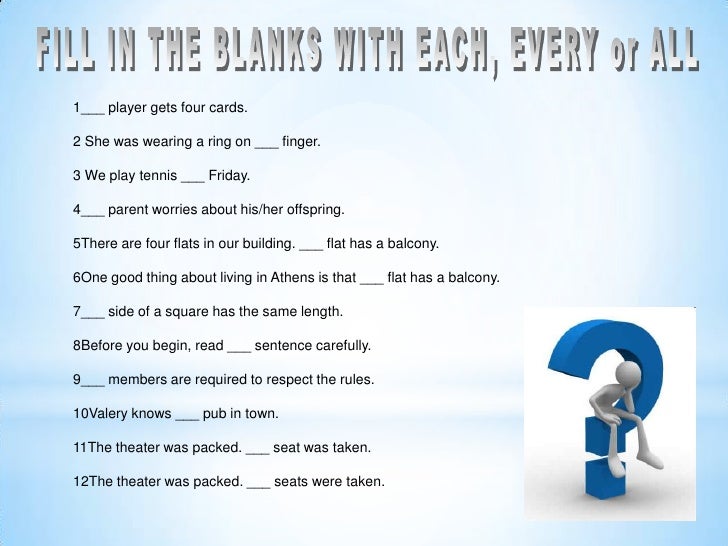
each, every and all
an adjective As a determiner, 'every' is used before nouns as a modifier. As an adjective, it is used before nouns as well, but it implies a slightly different meaning. I get him wrong every single time. → determiner I take a shower every day before I leave house for work. → adjective Verbs Agree with Nouns 'All':

every each English ESL worksheets pdf & doc
Grammar Vocabulary All and every have very similar meanings. We use them to talk about people and things in a general way. Every is used with singular countable nouns. When we are counting things separately one by one, we use every. I heard every word you said. All is used with plural nouns. All my friends are learning English